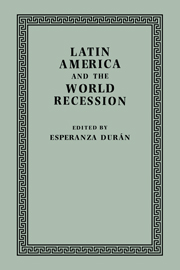Book contents
- Frontmatter
- Contents
- Contributors
- Preface
- 1 The Political Setting: ‘Business as Usual’ or a New Departure?
- Part One The Global Perspective
- Part Two Case Studies
- 5 Brazil's Foreign Debt: The National Debate
- 6 Mexico: Learning to Live with the Crisis
- 7 The Rise and Fall of the Chilean Economic Miracle
- 8 Venezuela: The Oil Boom and the Debt Crisis
- 9 World Recession and Central American Depression: Lessons from the 1930s for the 1980s
- 10 Conclusion
- Index
7 - The Rise and Fall of the Chilean Economic Miracle
Published online by Cambridge University Press: 05 February 2012
- Frontmatter
- Contents
- Contributors
- Preface
- 1 The Political Setting: ‘Business as Usual’ or a New Departure?
- Part One The Global Perspective
- Part Two Case Studies
- 5 Brazil's Foreign Debt: The National Debate
- 6 Mexico: Learning to Live with the Crisis
- 7 The Rise and Fall of the Chilean Economic Miracle
- 8 Venezuela: The Oil Boom and the Debt Crisis
- 9 World Recession and Central American Depression: Lessons from the 1930s for the 1980s
- 10 Conclusion
- Index
Summary
Laboratory experiments are, fortunately, not possible in the social sciences. But there can be no doubt that since 1970 Chile has been a testing-ground for sharply contrasting economic theories. From September 1970 to September 1973 the Popular Unity government under President Allende attempted to create a socialist economy with extensive government ownership and control. After a violent coup in September 1973 the country was moved in quite the opposite direction when a technocratic team, acting with the full support of the ruling military junta under General Pinochet, restored private ownership in many areas and opened up the economy to new competitive forces. The members of this technocratic team were known as ‘the Chicago boys’ because of their sympathy for the free-market doctrines associated with the University of Chicago. Although their work affected many parts of Chilean society, the emphasis in this paper is on their efforts to liberalize the financial system. The argument will be that both the apparent success of the free-market experiment until 1981 and its breakdown in 1982 can be explained largely by the course of financial liberalization. The other most salient reform, a programme of trade liberalization which opened the Chilean economy to foreign competition, interacted with financial liberalization in important ways, but it will not be discussed in detail here.
The financial liberalization should be understood as part of a reaction against a long-run tendency towards greater state interference with resource allocation.
- Type
- Chapter
- Information
- Latin America and the World Recession , pp. 98 - 119Publisher: Cambridge University PressPrint publication year: 1985



